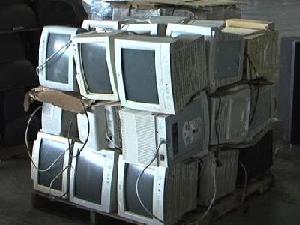
There is a growing problem of what to do with electronic waste such as old televisions, computers, radios, cellular telephones and other electronic equipment.
Electronic trash, or e-waste, is piling up faster than ever in American homes and businesses. People do not know what to do with old televisions or computers so they throw them in the trash.
National Solid Wastes Management Association state programs director Chaz Miller says the large amount of electronic waste Americans generate is not unexpected.
"We have so many electronic products that we use," said Miller. "They are being far more widely distributed throughout the population of the country and they tend to have relatively short life spans. Cell phones that last two or three years, computers that last maybe two or three years before they get replaced."
The US Environmental Protection Agency (EPA) estimates more than 400 million consumer electronic items are dumped each year, and there is a push by more states to ban the waste from landfills and create recycling programs.
"These are certain parts on board that come out of monitors, or TV, or even a sterio equipment."
As quickly as old electronics arrive at this recycling facility, they are torn apart and sorted for useable parts. Mike Fannon who runs the plant in Baltimore, Maryland, says e-waste here is resold to other companies that further break down the components that are valuable.
"There are a lot of valuable metals that can be recovered and reused as opposed to just putting them in the landfill and make them gone forever, and in certain components there are some materials that should not really be in the landfill," Fannon explained. Here workers break down and consolidate various parts of all electronics.
Fannon says nearly 20 percent of electronic waste is recycled nationwide. Thirteen years ago, it was only about six percent. Recycling rates continue to rise as more communities have banned electronics from landfills in an effort to keep e-waste toxins like lead and mercury out of garbage dumps. Many places have set up free drop off events where people can bring old items for recycling. At this e-recycling plant, they collected in the process nine million kilograms of all electronics last year.
Fannon says some items like old electronic circuit boards will get shipped to Canada, while other parts will be shipped to countries in Asia.
"These will go off actually to a copper smelter and they will go to recover the copper which is in a lot out of the lines within the [circuit] board itself but at the same time they recover precious metals that are on the board," added Fannon. "There is gold plating on a lot of the material. There is silver."
This year several states like Vermont imposed a ban on electronic waste in landfills. More than 25 other states have also adopted landfill bans, e-waste recycling programs or both. Chaz Miller says more can be done to boost electronic waste recycling.
"We can do much better than what is almost a 20-percent [e-waste] recycling rate," noted Miller. "I think clearly our goal should be to do as well with electronics products as say we do recycling newspapers."
Waste management analysts say US facilities can safely recycle items. Environmentalists maintain they can reduce the amount of electronic waste in landfills now by raising consumer awareness about the best ways to recycle e-waste.
landfills: an area of land where large amounts of waste material are buried under the earth 廢物埋填地
mercury: a chemical element. Mercury is a poisonous silver-white liquid metal, used in thermometers. 汞;水銀
Trashing America's throw-away culture
PC recycler strikes gold in old computer chips
In consumer electronics, 3-D and all things wireless
(來源:VOA 編輯:崔旭燕)
